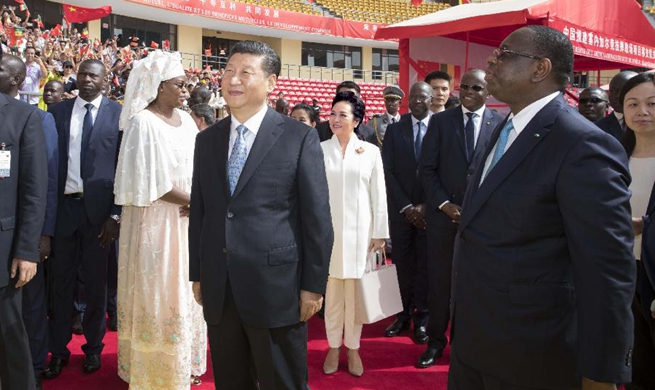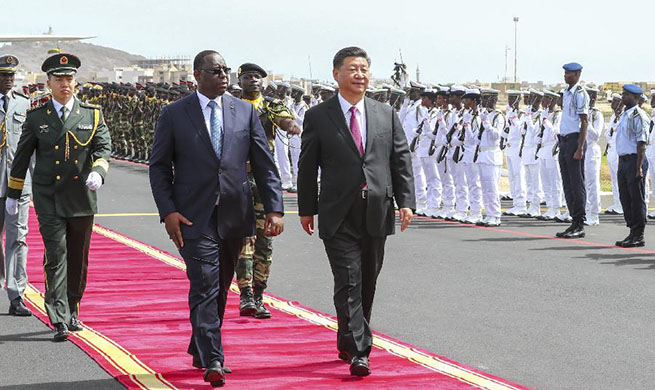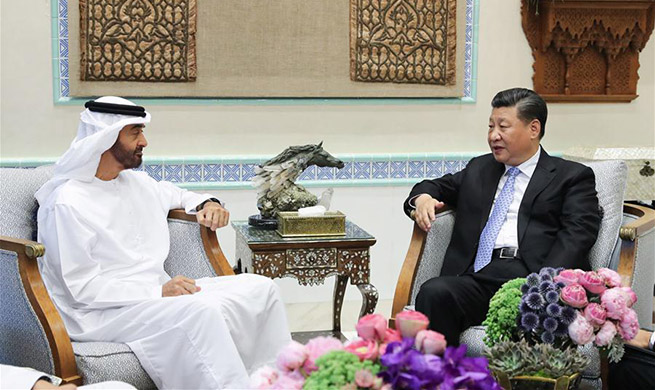by Murad Abdu
ADEN, Yemen, July 23 (Xinhua) -- Yemen's local currency continued to depreciate against major foreign currencies on Monday, worsening the economic woes as well as leaving many citizens destitute in the war-ravaged Arab country.
The Yemeni riyal is sinking faster and faster in recent days after nearly four years of deadly conflict. In the street markets in the southern port city of Aden, where the internationally-backed government is officially based, one U.S. dollar was traded for 506 riyals, up from 215 riyals the rate set before the war.
Commercial banks and a number of exchange centers in Aden complained about the continuing fluctuations of exchange rates and threatened to shut down and organize a "general strike" in the next days.
Ordinary Yemenis left destitute and increasingly desperate as a result of the current aggravating economic crisis and the sharp decline of their local currency against other foreign currencies.
Belal Adel, an Aden-based citizen, said that the living conditions sharply deteriorate every time the foreign currencies particularly the U.S. dollar go up against the Yemeni riyal.
"Our national currency is losing its value and everything is worsening in this country. We are struggling to survive this war but the financial problems will apparently destroy our life," Belal said.
"Prices of basic commodities are changing every day and getting much higher. Thousands of ordinary people are suffocated by the recent fall of the riyal that worsened the already difficult living conditions," he said.
He added that "I don't receive a monthly income but depend on everyday working as a main source to gain livelihood. After the riyal deterioration my life became more difficult because what I gain is not enough to feed my children."
As a result of the recent fall of local currency, Yemeni government authorities in Aden announced a new rise in prices of fuel subsides imported from other countries, provoking resentment and anger among people in the city.
According to the new pricing list of fuel subsides starting from the next week in Aden and neighboring government-controlled provinces, a 20-liter of gasoline will cost 7,400 Yemeni riyals, or 15 dollars.
A taxi driver near named Abdul-Rahman said while waiting for customers near Naqeeb public hospital "I barely gain four thousand Yemeni riyals after spending a whole day in suffering but this amount of money is not sufficient as everything costs higher nowadays."
"The increasing oil prices is another obstacle facing us. My children at home are waiting for me to bring vegetables and food for them but it looks like that my task will end in complete failure," Abdul-Rahman said.
"Farmers increased the prices of agricultural products because fuel prices went up. Some of the families who live in Aden or other provinces buy vegetables only once in week and others in month," he added.
Yemeni employees particularly those working with government institutions pointed out that their monthly salaries have been largely decimated by the recent deterioration of the country's national currency.
Hamid Mushtaq, a government employee, said that his salary is 80,000 Yemeni riyals per month. On Monday, that was worth 150 dollars at the parallel rate. Three years ago, it was 300 dollars.
Walid Harith, a newly-recruited police officer, said that he spends most of his salary 60,000 Yemeni riyals (120 dollars) in transportation costs while heading to his workplace everyday.
"I don't know what to do with this salary because the expenses of my family are much higher in these days. The government authorities must do a solution and help us," the officer said.
Yemen is facing the largest humanitarian crisis and cholera outbreak in the world after nearly four years of civil war. Two thirds of the population, nearly 21 million, need assistance and more than half of the population, around 16 million, lack access to safe drinking water and healthcare services.
Last year, the Yemeni government floated the national currency in a move that economic observers and analysts said was not well-studied a year after the relocation of the Central Bank to Aden.
The Yemeni economy is continuing to suffer after all exports were halted following a blockade on the country which was part of a Saudi-led military intervention in March 2015. The blockade has also restricted imports largely.
All investments including oil and gas projects, whose revenues used to contribute more than 70 percent of the state budget, were shut down.
Flow of foreign cash has stopped almost completely and widespread corruption within the government institutions is among problems deepening economic misery.
















